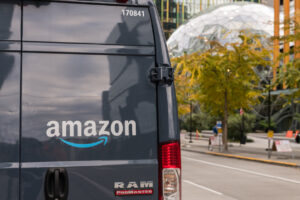The Daily Scoop: The unexpected implications of working with parenting influencers
Plus: Hollywood writers talking with studio reps Friday, Central Florida Tourism Oversight District ends DE&I programs and initiatives.

Are the kids all right?
That’s the question that a growing number of parenting influencers are asking themselves as some have decided to change how and how much they show their children on social media, The Washington Post reported.
Grant Khanbalinov is one of those parents whose children are described as TikTok stars online. As a former family vlogger, Khanbalinov’s TikTok account had 3.3 million followers.
“I went from this average person, this nobody, to getting brand deals,” Khanbalinov told the Post.
Eventually, Reddit posters accused Khanbalinov and his wife of exploiting their children and forcing them to take part in filming scripted videos. Khanbalinov at first objected then later had second thoughts. He decided that he didn’t like that strangers knew personal details about his children or that his children’s online and real personas seemingly blurred even off camera. He stopped sharing. He thinks other parents are slowly but surely getting the same idea.
University of Florida’s College of Law Professor Stacey Steinberg told the Post that, “Children have an interest in privacy” but when parents post their kids online, they “do so without their children’s consent.”
Why it matters: Parents taking sponsorship deals that involve showing their children could lead to fallout later on. Parents — and growing children — can change their mind about sharing this content online. That can lead to negative perceptions about brands which sponsor that content. Public backlash could heavily impact your audience’s perception and this could be disastrous for your brand’s image, leading to potential negative press and criticism.
Influencer Jolene Vargas felt called out and stopped showing her son’s face in videos, per the Post.
“It’s so embarrassing, because my page has been a lot about consent and respecting children and letting children have choices,” Vargas told the Post. “But here I am posting my kids without their consent, disrespecting their autonomy.”
PR pros, use caution when your brand decides to work with parental influencers who include their child, or child influencers. Expect this issue to continue to gain steam as more children who were featured on social media age and speak of the harms. The lucrative nature of brand deals is surely a driving factor in some parents’ decision to display their children in these ways. Beware of a negative halo effect for your brand. Consider the potential reputational issues and risk down the line.
Editor’s Top Picks:
- The Writers Guild of America will meet with Hollywood studio reps from the Alliance of Motion Picture and Television Producers on Friday. This meeting would be the first one since both groups attempted to bargain in May, resulting in a writer’s strike, which actors later joined. AMPTP has yet to reach out to the Screen Actors Guild on strike. Duncan Crabtree-Ireland, SAG-AFTRA’s national executive director and chief negotiator, said the guild’s actors are keen to “return to the table at any time,” The Washington Post reported. An AMPTP spokesperson stated, “We remain committed to finding a path to mutually beneficial deals with both unions,” per the Post. If things go well and AMPTP extends an olive branch to actors, this could be a much-needed boost for Hollywood and a return-to-normal for publicists.
- The Central Florida Tourism Oversight District, which governs Walt Disney World, ended all DE&I programs and will strip away related committees and jobs that the former Reedy Creek Improvement District developed. The Gov. Ron DeSantis backed-Oversight District gained control of the district in February after mounting issues between the government and Disney. The Oversight District said that DE&I practices discriminated against Americans and cost taxpayers millions. It’s part of an overall growing DE&I backlash from conservatives, only growing stronger in the wake of the Supreme Court’s affirmative action decision.
- According to research from Empower, three out of 10 parents expect to spend over $500 on their back-to-school supplies this year. Forty percent of parents plan to shop at dollar or discount stores. Eighty-five percent of parents said in the survey that inflation influenced their school supply shopping choices. These financial constraints hampered 19% of parents’ summer travel and plans, per the survey. This left many to find free entertainment including outdoor activities (78%), educational attractions (59%) and arts and crafts projects (54%).
Sherri Kolade is a writer at Ragan Communications. When she is not with her family, she enjoys watching Alfred Hitchcock-style films, reading and building an authentically curated life that includes more than occasionally finding something deliciously fried. Follow her on LinkedIn. Have a great PR story idea? Email her at sherrik@ragan.com.







